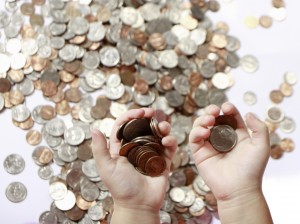Childhood Depression – Helping Your Child Through it
Children are as prone to depression as adults. Youngsters do not get depressed for the same reasons and not to the same degree as adults but they can get down and feel blue in a similar manner to grown-ups.
Depression is a mental disorder that it was once believed did not affect youngsters at all. Research studies that have looked closely at this over the years have discovered that this is not the case. It has been estimated that as many as three in 100 young children suffer from the effects of depression. Depression in children needs to be acknowledged and addressed the same as it does in adults and an appropriate treatment needs to be undertaken before it leads into a more serious stage.
What Causes Depression in Children?
 Just as depression in adults is not necessarily brought on by one particular thing but can be influenced by a number of factors, the same can be said for depression in kids. Childhood depression can come about due to a genetic predisposition towards it. It can also result from a traumatic or stressful event in life such as a death, a new school or a move to a new place. Medications can sometimes bring about depression as can an imbalance of chemistry in the brain. Learned helplessness is also believed to be a potential cause of depression in kids when it works in combination with the type of personality traits that a youngster has.
Just as depression in adults is not necessarily brought on by one particular thing but can be influenced by a number of factors, the same can be said for depression in kids. Childhood depression can come about due to a genetic predisposition towards it. It can also result from a traumatic or stressful event in life such as a death, a new school or a move to a new place. Medications can sometimes bring about depression as can an imbalance of chemistry in the brain. Learned helplessness is also believed to be a potential cause of depression in kids when it works in combination with the type of personality traits that a youngster has.
Seeing the Doctor for a Diagnosis
If your child seems lethargic and is sad and unhappy all of the time and no longer enjoys spending time with his friends or doing the things he use to enjoy doing then it may be time to take him in to see his doctor. The family physician has the training needed to make a proper diagnosis. He can first rule out other physical problems as the cause of the condition.
After examining the child and asking him or her series of questions the doctor will then be able to decide if the child is suffering from depression. If he is then one of the most suitable means of helping a young child is by way of counseling. For children who are quite young play therapy can be very beneficial to helping them to cope with their depressive feelings and thoughts while for older kids cognitive behavior therapy tends to be the most helpful approach to dealing with depression. Sometimes family therapy is recommended or in some cases, interpersonal therapy.
Most doctors do not prescribe antidepressants for their young patients as their brains are still in the developing stages. In the rare cases where medication is prescribed it is used as a last resort and not as the first option for treatment. If medication is used then it is combined with a type of therapy. This is something that as a parent you must discuss with your child’s doctor. You must consider the advantages and disadvantages of every treatment option.
Helping Your Child
As a mother you do not have to sit back and take a passive role as you watch your child battle with depression. As a loving and supportive parent there are plenty of ways in which you can support your child in having the most uplifted mental state possible. To contribute to positive mental health and a better outlook you can do everything possible to ensure that your child eats as nutritiously as possible, gets enough exercise on a daily basis and gets the right amount of sleep. It is also extremely important that you are always available to listen to your child and to talk with him whenever he is feeling sad or upset. Your child needs to know that you are there for him and that he will be heard.
A child who is depressed feels that his world is falling apart and caving in on him. You need to shower him with love and understanding and he needs to know that you are his biggest supporter. Show your child that you are in his corner and let him know that he will get through this difficult period of time in his life with your help.
Share the fun: Email + Del.icio.us + Digg + Technorati




 As a mother you should not be frightened or bothered when you child wants to earn money of his own but you should feel a sense of pride. Everyone must start somewhere when it comes to the use of money and one place that is good for youngsters to start is selling glasses of juice or lemonade for a few cents from a homemade stand that you set up for you child in the front yard. You can oversee the whole process and it can serve as a valuable lesson for your son or daughter.
As a mother you should not be frightened or bothered when you child wants to earn money of his own but you should feel a sense of pride. Everyone must start somewhere when it comes to the use of money and one place that is good for youngsters to start is selling glasses of juice or lemonade for a few cents from a homemade stand that you set up for you child in the front yard. You can oversee the whole process and it can serve as a valuable lesson for your son or daughter.